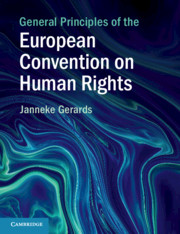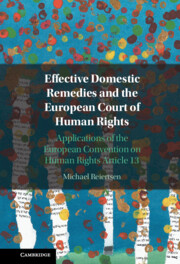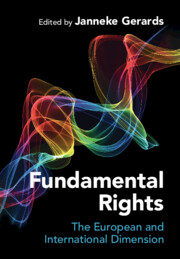General Principles of the European Convention on Human Rights
- Author: Janneke Gerards, Universiteit Utrecht, The Netherlands
- Date Published: March 2019
- availability: Temporarily unavailable - available from TBC
- format: Paperback
- isbn: 9781108718288
Paperback
Other available formats:
eBook
Looking for an inspection copy?
This title is not currently available on inspection
-
The European Convention on Human Rights is one of the world's most important and influential human rights documents. It owes its value mainly to the European Court of Human Rights, which applies the Convention rights in individual cases. This book offers a clear insight into the concepts and principles that are key to understanding the European Convention and the Court's case-law. It explains how the Court generally approaches the many cases brought before it and which tools help it to decide on these cases, illustrated by numerous examples taken from the Court's judgements. Core issues discussed are the types of Convention rights (such as absolute rights); the structure of the Court's Convention rights review; principles and methods of interpretation (such as common ground interpretation and the use of precedent); positive and negative obligations; vertical and horizontal effect; the margin of appreciation doctrine; and requirements for the restriction of Convention rights.
Read more- Explains all relevant substantive concepts and principles of ECHR law in a coherent and understandable fashion to enable students to apply them in their professional work
- Uses many examples of the Court's case-law to illustrate the relevance and meaning of the various general principles and concepts and to help students appreciate its practical applicability
- Shows how the ECHR is also relevant to private law cases and contains many aspects of socio-economic rights, enabling students to see the ECHR's application in various fields of law, such as employment law or sustainability law
Reviews & endorsements
'Professor Gerards' book is a splendid contribution to the literature on the European Convention on Human Rights. With copious quotations from the judgements, the author demonstrates how rich and significant the jurisprudence on Convention principles has become. A must-read for anyone interested in the Strasbourg system and human rights law generally.' Steven Greer, University of Bristol
See more reviews'Gerards' book discusses the basic rules of the game that anyone who studies or works with the Strasbourg case law needs to familiarize themselves with: methods of interpretation, positive and negative obligations and their respective criteria, the margin of appreciation … These issues are of course discussed in the handbooks on the European Convention on Human Rights. Yet this book-length analysis gives them the attention they deserve, and allows for more thorough and nuanced analysis. Gerards is a leading scholar on European Court of Human Rights reasoning, and her discussion of these classical topics is very insightful.' Eva Brems, Universiteit Gent
'Janneke Gerards is one of the best Court-watchers of our time. She has a keen knowledge of the Court's case law. In this book, written in a readily accessible language, she describes the basic Convention principles, many of them established decades ago, and analyses how they have developed over time. With thousands of judgments delivered by the Court, it is sometimes difficult to see the forest through the trees. Gerards' book skilfully guides the reader through the forest and points to the lasting contribution of the truly leading cases, while illustrating or nuancing her findings with examples taken from more recent ones. The book is not merely descriptive. Gerards engages with the Court and is often critical of its case law. This is an exceptional book, because it is solidly evidence-based and at the same time offers a full-fledged general theory of the Convention.' Paul Lemmens, Judge, European Court of Human Rights
'This book provides an excellent picture of the foundational principles and working methods of the ECHR. Human rights theory and practice are articulated in an enlightening manner in this book. By discussing thoroughly the basic principles governing the Court's work, the effective protection of fundamental rights and subsidiarity, Professor Gerards sets the stage to clarify the two main functions of the European human rights protection system, which aims at providing individual redress to victims of human rights violations and setting European wide, constitutional standards on fundamental rights and freedoms. Furthermore, the structure and typology of the Convention rights are presented on the basis of a careful analysis of the different stages of the Court's Convention review and the possibilities for regulating the exercise of these rights. In a word, this book is a must-read for practitioners as well as scholars.' Paulo Pinto de Alburquerque, Judge of the Court of Human Rights
Customer reviews
Not yet reviewed
Be the first to review
Review was not posted due to profanity
×Product details
- Date Published: March 2019
- format: Paperback
- isbn: 9781108718288
- length: 274 pages
- dimensions: 246 x 190 x 14 mm
- weight: 0.62kg
- availability: Temporarily unavailable - available from TBC
Table of Contents
1. Basics of the Convention system
2. The Court's overall argumentative approach: mediating between the abstract and the concrete
3. Principles governing the interpretation and application of Convention rights
4. Methods of Convention interpretation
5. Positive and negative obligations
6. Vertical and horizontal effect
7. The margin of appreciation doctrine
8. Justification of restrictions I: lawfulness
9. Justification of restrictions II: legitimate aim
10. Justification of restrictions III: necessity, proportionality and fair balance
Index.
Sorry, this resource is locked
Please register or sign in to request access. If you are having problems accessing these resources please email [email protected]
Register Sign in» Proceed
You are now leaving the Cambridge University Press website. Your eBook purchase and download will be completed by our partner www.ebooks.com. Please see the permission section of the www.ebooks.com catalogue page for details of the print & copy limits on our eBooks.
Continue ×Are you sure you want to delete your account?
This cannot be undone.
Thank you for your feedback which will help us improve our service.
If you requested a response, we will make sure to get back to you shortly.
×




.jpg)



